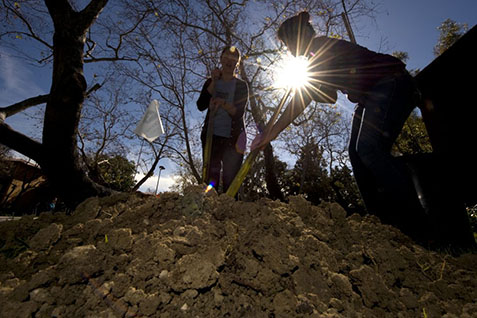Soil Will Absorb Less Atmospheric Carbon than Expected This Century
An analysis suggests models overestimate soil’s potential for carbon sequestration.

The Science
Researchers used radiocarbon dating to determine that current soil carbon is about 3,100 years old rather than the 450 years stipulated by many Earth system models. Most global models that participated in the latest Coupled Model Intercomparison Project (CMIP5) underestimated the mean age of soil carbon. This underestimation results in an overestimation of soil’s carbon sequestration potential. Consequently, more carbon dioxide emissions than previously thought could remain in the atmosphere and contribute to global warming.
The Impact
These findings have important implications for future atmospheric carbon dioxide levels. The results emphasize the need to incorporate better insights into soil carbon cycling into Earth system models. The results also highlight the need for more insights into carbon-14 and other tracer diagnostics. These insights would improve the quality of future climate projections. The work also illustrates the potential value of systematically exploiting available ecosystem measurements during model development to create models that are more robust.
Summary
Soil is the largest terrestrial carbon reservoir and may influence the sign and magnitude of carbon cycle–climate feedbacks. Many Earth system models estimate a significant soil carbon sink by 2100, yet the underlying carbon dynamics determining this response have not been systematically tested against observations. Researchers from the University of California, Irvine, Max Planck Institute for Biogeochemistry, Lawrence Berkeley National Laboratory, Stanford University, and U.S. Geological Survey used carbon-14 data from 157 globally distributed soil profiles sampled to 1-meter depth to show that Earth system models underestimated the mean age of soil carbon by a factor of more than six (430 ± 50 years versus 3100 ± 1800 years). Consequently, Earth system models overestimated the carbon sequestration potential of soils by a factor of nearly two (40 ± 27%). This analysis shows that Earth system models must better represent carbon stabilization processes and the turnover time of slow and passive soil carbon reservoirs when simulating future atmospheric carbon dioxide dynamics.
Contact
Contacts (BER PM)
Dan Stover
SC-23.1
Daniel.Stover@science.doe.gov
301-903-0289
Renu Joseph
SC-23.1
Renu.Joseph@science.doe.gov
301-903-9237
(Author Contact)
James T. Randerson
Department of Earth System Science, University of California, Irvine
jranders@uci.edu
949-824-9030
(PI Contacts)
Margaret Torn
Terrestrial Ecosystem Science Scientific Focus Area
Climate and Ecosystem Sciences Division
Lawrence Berkeley National Laboratory
mstorn@lbl.gov
510-495-2223
Forrest Hoffman
Biogeochemistry-Climate Feedbacks Scientific Focus Area
Oak Ridge National Laboratory
forrest@climatemodeling.org
865-576-7680
Funding
This research was performed for the Biogeochemistry–Climate Feedbacks Scientific Focus Area (SFA) and the Berkeley Lab Terrestrial Ecosystem Science (TES) SFA, which are sponsored by the Regional and Global Climate Modeling and TES programs, respectively, in the Climate and Environmental Sciences Division of the Office of Biological and Environmental Research, Office of Science, U.S. Department of Energy.
Publications
Y. He, S.E. Trumbore, M.S. Torn, J.W. Harden, L.J.S. Vaughn, S.D. Allison, and J.T. Randerson, “Radiocarbon constraints imply reduced carbon uptake by soils during the 21st century.” Science 353(6306), 1419-1424 (2016). [DOI: 10.1126/science.aad4273]
Related Links
University of California press release: Soil will absorb less atmospheric carbon than expected this century UCI-led study finds
Biogeochemistry–Climate Feedbacks Scientific Focus Area: http://www.bgc-feedbacks.org/
Lawrence Berkeley National Laboratory article: Berkeley Lab scientists contribute to new soil carbon study
Chemistry World news: Soil sponge soaking up far less carbon dioxide than expected
ScienceDaily news article: Soil will absorb less atmospheric carbon than expected this century, study finds
The Guardian, September 22, 2016: Soil carbon storage not the climate change fix it was thought, research finds
Washington Post, September 22, 2016: The Earth is soaking up less carbon than we thought — which could make it warm up even faster
Highlight Categories
Performer: University , DOE Laboratory



